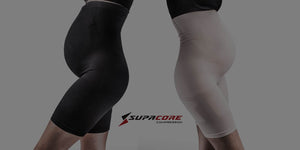Post pregnancy muscle separation - ab separation
Dr Carolyn Tayor
What is ab separation?
Diastasis of the Rectus Abdominis Muscle (DRAM) or Diastasis Recti is more commonly referred to as Abdominal Separation and effects the rectus abdominis muscle - which is the muscle at the front of the abdomen, which runs from the ribcage to the pubic bone. In well trained people, it is the ‘6-pack’ muscle. The join in the middle of the rectus abdominis muscle is called the linea alba.
Abdominal separation or Post pregnancy muscle separation occurs during and after pregnancy and is the stretching and separation of the linea alba above and / or below the navel. It may be small in both width and length (hardly noticeable) to large (over 12 centimetres wide and extend along the whole linea alba). In larger separations, part of the abdomen can protrude, creating a bulge at the separation.
Abdominal separation more than 2.5 centimetres can be a problem as it can contribute to low back and pelvic pain when new Mums are busy caring for their babies and other children.
Post pregnancy muscle separation
The more children a woman has, the greater the potential of developing abdominal separation due to stretching and separation of the linea alba with previous pregnancies and caring for older children. For example, lifting toddlers can put extra stain on the abdominal muscles and prevent the abdominal separation from improving.

When does abdominal separation occur?
Abdominal separation is very common during and after pregnancy. During pregnancy, a hormone called relaxin softens the ligaments of the pelvis to prepare for childbirth. The relaxin also softens the linea alba and as the baby grows and the abdominal muscles stretch, the linea alba stretches and separates. This is most common toward the end of pregnancy, as the baby gets bigger.
How to identify abdominal separation
Many women will notice a separation and bulge in the middle of their rectus abdominis muscle when they are lifting or doing exercises like sit ups. To check if abdominal separation is present, do a single sit up and feel along the linea alba for a separation and / or bulge.
How to manage abdominal separation during pregnancy

- Stay fit and continue with exercise as long as possible during your pregnancy. If you are no longer able to do your usual exercise, Pilates and water-based exercise are good options.
- If you notice a separation greater than 2.5 centimetres, see a healthcare professional who specialised in pregnancy related conditions, such as a Women’s Health Physiotherapist. A Women’s Health Physiotherapist will assess you and may prescribe exercises and give you an external support, such as TubigripTM or a corset to wear to support your abdomen.
- Supacore CORETECH™ Pregnancy Shorts will give you the same support as TubigripTM or a corset, in a comfortable pair of shorts.
How to manage abdominal muscle separation post pregnancy
- Abdominal separation or Post pregnancy muscle separation often resolves naturally in the first 8 weeks after pregnancy; however, if you continue to have a separation more than 8 weeks after giving birth, consult a Women’s Health Physiotherapist.
- Do exercises pelvic floor muscles and transversus abdominis muscles exercises.
- Avoid sit ups – these put more strain on the rectus abdominus and the separation.
- Find a knowledgeable Pilates instructor and do Pilates. This could be studio sessions or matwork classes designed for new Mums.
- Avoid lifting heavy things over about 5-10kg. This includes small children – encourage them to climb and help you, rather than simply lift them (this can be difficult – we know!).
- Wear Supacore Women’s CORETECH™ compression shorts and leggings to support and protect your pelvis and low back.




